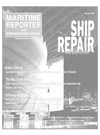
Jotun Goes Tin-Free
According to Stein Kj0lberg, marketing manager for marine products at Jotun Paints, "The launch of SeaQuantum heralds a breakthrough in tin-free antifouling systems: Jotun's new coating has undergone extensive testing and offers up to five years of effective protection against fouling on ship bottoms." Developed in conjunction with Japanese chemicals group Nippon Oil and Fats (NOF), Jotun has reportedly uncov- ered a practical tin-free solution suitable for virtually any application.
Although tin-free alternatives have been on the market for quite some time, none have proven to go the distance in meeting the shipping sector's need for five-year systems. Lasting only three years instead of the required five, most of these substitute systems still cannot offer the same self-polishing effect posted by tin-based coatings. Contrastingly, the self-polishing aspect is present in SeaQuantum — holding properties that bear chemical and physical properties - that are almost uncanny to tin-based antifouling coatings. In translation, the product blends protection against fouling with a hydrolysis reaction, making the vessel's bottom increasingly smooth as the coating wears — creating a more efficient vessel. The company recommends the product be applied to both newbuilds and full bottom upgrades.
Undergoing a little less than seven years of trials, the new coating from Jotun. according to Kj0lberg is "the most tin-free marine antifouling system on the market today." Jotun has basked in a product and research venture with NOF for many years. With Jotun developing the formulation for the actual coating, NOF spearheaded a silyl polymer that can replace the environmentally-dangerous tin compounds used in today's self-polishing antifouling coatings.
Circle 139 on Reader Service Card
Other stories from March 2000 issue
Content
- A broader-based payback from R&D page: 8
- An Effective Shield from Criminal Prosecution page: 14
- MARCO Signs Contract With S.F. Bar Pilots page: 16
- MAN Acquires Alstom Diesel Engine Ops page: 16
- South Korean January Ship Orders Increase page: 17
- Dockwise Awarded Hanjung Contract page: 17
- The U.S. Navy - Reducing Shipboard Planned Maintenance page: 20
- Safety Charter Targets Old Tankers, Flags Of Convenience page: 20
- High Times Again in Singapore? page: 22
- Ship Repair Yards Ask: Where's the Funding? page: 26
- Ailsa-Troon Continues To Climb page: 27
- Irving Shipbuilding Repairs Wide Selection page: 29
- Vessels Make Pit Stop At Bay Ship page: 30
- Tampa Bay Shipbuilding - Gearing Up For A Boom page: 31
- Bollinger Puts Its Expertise To The Test page: 32
- Turbo-Technik: Rescuing A "Prinsesse" page: 33
- Smooth Sailing page: 34
- Seacoast Delivers Package To Halter page: 34
- JRC Radar Offers Plotter System page: 34
- SKYbolt Enables Real Time Processing page: 38
- Transas Moves Towards Auto Integrated Navigation page: 44
- Litton To Supply For New Passenger Ferries page: 44
- Riverboat Casino Ratings Buoyed by Regulations, Demand page: 48
- Washburn & Doughty: Developing New Process To Meet Changing Needs page: 49
- Fictitious Tugboat Character Goes Live In Canada Yard page: 51
- Bollinger opts for Oracle page: 52
- BIMCO Introduces Millennium Software page: 55
- Ship Safety Database Set Up To Avoid Future Disasters page: 55
- WindShip Technology Promises Fuel Saving s page: 56
- Recore Classified As Fireproof For Vessels page: 56
- Sandwiched Composites Offer Promise For Marine Industry page: 57
- Fiberline Offers GRP For Use In Hostile Environs page: 57
- AMT Marine To Construct Utility Boat page: 59
- Sneed Delivers Pushboat To Blessey Marine page: 59
- Alert in Valdez Harbor page: 60
- 3.MAJ Delivers Innovative Tanker page: 61
- Robert Allan Design To Be Built For Brusco page: 62
- New Surface Cleaning Process Saves Navy On Maintenance page: 65
- Jotun Goes Tin-Free page: 66
- Se-Cliff Enhances With CoreKote 2000 page: 69
- Japan: Advanced procedures sustain industry in turbulent markets page: 74
- JAMSTEC Deepsea Exploring Ship Contract Announced page: 75
- Power management with distributed intelligence page: 76
- Chamber Of Shipping Requests Entries page: 77
- The Erika oil spill - using the incident to positive effect page: 80
- NCL Board Dumped, Lund Appointed page: 92
- Litton Integrates Marine Ops In New Company page: 92

